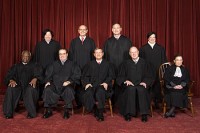How to Depoliticize the Supreme Court
 One way we can improve the U.S. system of government is to change the nature of U.S. Supreme Court appointments. Anyone watching the appointment process realizes that there is a bitter partisan rivalry in which the money funding Democratic and Republican interests is highly involved, resulting in judges more serving oligopolic and ideological interests than serving the general society and Constitutional principles, with legal skills as top Constitutional scholars.
One way we can improve the U.S. system of government is to change the nature of U.S. Supreme Court appointments. Anyone watching the appointment process realizes that there is a bitter partisan rivalry in which the money funding Democratic and Republican interests is highly involved, resulting in judges more serving oligopolic and ideological interests than serving the general society and Constitutional principles, with legal skills as top Constitutional scholars.
Another problem with the Supreme Court, in retrospect, is that it generally serves the consolidation of federal power, having little desire to see the states as a check on federal power. This is, in part, because it is part of the federal government, appointed by federal elites, and the power and prestige of the federal government reflects on the Court.
I would like to propose and appointment system that would serve as a corrective to this problem, giving us a Court less controlled by money and more responsive to the concept of a federal system rather than to a consolidated national state:
When there is a Supreme Court vacancy, allow each state legislature to nominate a highly qualified constitutional scholar from their state. Then choose from the nominations by lottery.
Drawing lots is the surest way of guaranteeing that no financial interest could control the outcome. That interest would have to control the selection process of 50 state legislatures. Further, state legislatures will be more concerned about state’s rights and interests, and tend to appoint justices that have a higher level of scholarship and will represent state interests rather than interests of corporations, labor unions, or other divisive political factions.


The suggestion to have States legislatures suggest candidates for Supreme Court vacancies is an innovative idea. But, are not the States, also influenced by oligopolic and ideological interests ? Perhaps it is a sign of the times … the end of history, that the Supreme Court shows glaring signs of political polarization. Not that the SC is immune from controversy from the era of Jim Crow, the Equal Rights Amendment and recent opinions on corporate campaign financing. The Court is human … that is to say, to err is to be human. Naturally, we would expect the high court to be removed from the influence of PAC monies, unions and divisive factions. What then are the specific views representing states rights that characterize a ” higher level of scholarship ? ”
We are advocating for triple objective purpose- 4PF theory as the basis of cognition, interdependence, emotion based ethic of fairness, tranquility and justice. It’s an ideology of human responsibility, reason and restraint.
No abuse of human rights, no misuse of public funds and no misuse of love. The ordained exercise of citizen or state rights, libertarian views and the free market pursuit of happiness, does not come without moral restrictions and legal restraints. Herein, lay the perennial problems of human reason, choice, ethics and accountability. Democracy is a form of government suitable only for a moral people. For the moment, the SC seems to have strayed from this fundamental level of scholarship and transparency ( TOP/4PF ).
Of course state legislatures are influenced by oligarchs, but lotteries guarantee that no oligarchs can control the final outcome, which means they have less incentive to invest in it. If state legislatures are nominating a candidate, he/she would most likely not be so interested in using federal power to subdue the state. Why would a state nominate someone opposed to its own interest in states rights?
Also, at the state level the citizens of the state will better hold the legislature accountable for their choice, so the legislatures would be incentivized to select a person that citizens respected for qualifications or the legislators might get voted out.
Of course, we can set the various virtues you list as standards we want to see in a justice and citizens are more likely to vote for these virtues than oligarchs are. The big challenge is a system that eliminates economic motives and encourages citizen representation.